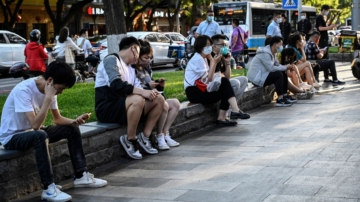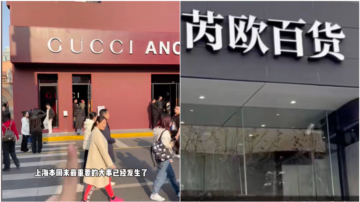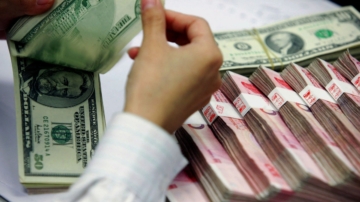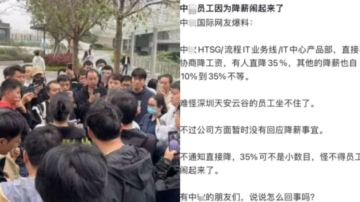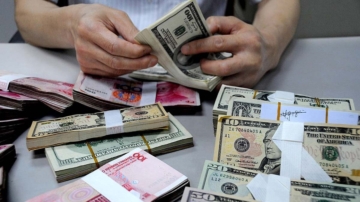【新唐人2013年08月16日讯】最近海内外很多媒体都刊登了一条消息:位于大陆杭州市郊的“天都城”小镇复制法国巴黎面貌,不仅模仿巴黎的建筑风格,还搭建艾菲尔铁塔、凯旋门等地标。可是,本来可以容纳10万人的城镇,现在只有2000人住,几乎只剩下给新人拍婚纱的功能,成为名符其实的“鬼城”。请看报导。
“天都城”小镇的设计预期容纳10万人居住,于2007年开始兴建,全部完工预计要到2015年。
这里的一切都仿造巴黎传统建筑,还有模仿得维妙维肖的艾菲尔铁塔,只不过这个赝品,高只有108米,真正的艾菲尔铁塔高324米。此外,还有仿造的香榭丽舍大道和巴黎战神广场,而在一片人工湖边上,则有假的香波尔城堡和凡尔赛宫的公园。
然而,看似富丽堂皇的城镇,平日大街上只能看到数十人出没,估计居住在此的民众不超过2000人。人们用“鬼城”来称呼这个空荡荡的小镇。
法国摄影记者马特修(Matthew Niederhausser)居住在中国,他在个人的博客上说,“天都城”里许多空着的公寓都被工地的工人住上了﹔当地的农民则利用铁塔旁的空地种起了蔬菜;此外,对于没钱出国旅游的新婚夫妇来说,倒也不失为一件美事,可以到这个“假巴黎”过把瘾,租一套有“凯旋门”风景的300平方米大公寓度蜜月,一个月房租才500欧元。
独立学人巩胜利指出,杭州市是大陆省会城市房地产收入最高的,占了财政收入的很大比例,远超过其他城市,所以,它能驾驭很多房地产企业。
《国情内参》首席研究员巩胜利:“一般的考虑这种环境与官商有关,因为国家的土地、官的投资,它不靠让老百姓来住的,放那也是放,卖了也是卖,钱来的多与少,它有地方政府的财政保障。所以它就不急于出手。”
法国《城市建筑》杂志指出,当地直上云霄的房价,将大部分人驱逐出了“天都城”。
台湾《旺报》引述“天都城”专案设计师卢晓天的话说,这是为了给大陆有钱人创造足不出户的“异域风情”。《旺报》认为,建筑“天都城”背后的意义,是为了推进GDP成长,这也是政府的首要目标。
大陆《新快报》指出,美国、日本基本没有土地出让收益,香港土地出让收益一般只占政府收入的12.9%,而大陆的土地出让收入在地方财政总收入中占30%以上。
实际上,在大肆开发房地产、追求GDP增长的同时,不仅大陆迅速造就了一批像内蒙古鄂尔多斯、呼和浩特清水河、巴彦淖尔、二连浩特,河南的郑州郑东新区、鹤壁,辽宁营口,江苏常州、镇江丹徒,湖北十堰,云南呈贡等着名“鬼城”,还大大增加了地方政府的债务。中共财政部原部长项怀诚估计,今年的地方政府债务可能超过20万亿元,国外甚至有专家认为将超过40万亿元。
《新快报》指出,2011年对中国的地方政府性债务审计发现,12个省、307个市、1131个县承诺用土地出让收入作为偿还债务来源,而实际上目前中国地方债务仅一年利息就达到1.2万亿元。
深圳当代社会观察研究所所长刘开明表示,要改变中国现状是难上加难。他认为,如果土地还是国家所有,想卖就卖,中共制造“鬼城”的怪圈还会延续下去。
深圳当代社会观察研究所所长刘开明:“很重要的还是要确定私有财产,另外,政府它的收支要透明。土地归私人所有的话,应该可以要好一点,当然对地方政府的财政来源开辟了一个监督。”
巩胜利引述一位学者的话说,中国的土地、房地产产权只属于国家,对这个国家的稳定是要命的。
采访/朱智善 编辑/宋风 后制/陈建铭
China's Replica of Paris Becomes "Ghost Town"
A town which is a replica of Paris, located on the outskirts of
Hangzhou, has become a heated topic for media in China and overseas.
The housing project, designed to house 100,000 residents
however, sees only about 2,000 people daily.
It has been reduced to a backdrop for wedding photos,
and has become known as a "ghost town".
The Tiandu community was designed to house
up to 100,000 residents.
The construction of Tiandu started in 2007,
it is expected to be fully completed by 2015.
In the town, all buildings are replicas of traditional
buildings in Paris.
One of them is a to-scale Eiffel Tower,
which is 108 meters high.
There are also replicas of the Avenue des Champs-Élysées
and Champ de Mars.
Near an artificial lake, stand dummies of the
Chambord Castle and the Park of Versailles.
However, the seemingly palatial town only sees several
dozens of people on the streets daily.
It is estimated that the town currently houses only around
2,000 residents, and is known as a "ghost town".
French photographer, Matthew Niederhausser,
now lives in China.
His micro-blog posts say that many migrant workers now
occupy the town's apartments , and are idle.
Whilst local farmers have planted vegetables
in the unused lands beside the Tiandu Eiffel Tower.
For some non-wealthy Chinese honeymooners, the town
has become a substitute for a real trip to Paris.
Rent a 300 square meters apartment with "Arc de Triomphe"
landscape only cost 500 euros per month.
Gong Shengli, senior think-tank researcher in China,
says that Hangzhou tops the nation's capital cities for its high proportion of real estate tax revenue.
For this reason the city has
attracted many property developers.
Gong Shengli: "Generally speaking, the situation is a
result of collusion between officials and businessmen.
In China, lands are state-owned, and
the authorities control property investments.
The property developers have gained bank loans,
as local authorities provide guarantees.
So they aren't over eager
to sell the properties."
Reportedly, sky-high house prices have made
Tiandu inaccessible for most citizens.
Taiwan's Want Daily quotes Lu Xiaotian,
project designer of the Tiandu community.
Lu says that this is an "exotic" housing project
designed for the wealthy mainlanders.
Want Daily speculates that the main reason behind
the Tiandu project is to boost local GDP.
It is the Chinese authorities' No.1 priority.
China's Xinkuai Daily reports that in the US or in Japan,
governments do not make profits from land selling.
In Hong Kong, land selling profit generally
account for 12.9% of government revenue.
Whilst in China, state-owned land sales contribute to
over 30% of local fiscal revenues.
In reality, heat waves of real estate development in China,
which aims to promote GDP growth, have created nationwide "ghost towns".
They spread over cities in Inner Mongolia, in Henan,
Liaoning, Jiangsu, Hubei, and in Yunnan provinces.
These housing projects have greatly increased
local government debt.
Xiang Huaicheng, ex-minister of Finance, has estimated
that local government debt may exceed 20 trillion yuan.
Foreign experts have reportedly said that
the figure may be over 40 trillion yuan.
Xinkuai Daily reports that in 2011, a national audit of
local-government debt shows that 12 provincial authorities,
307 municipal-level authorities and 1,131 county level
authorities have used land sales as debt guarantee.
Currently, the annual local debt interest has reached
1.2 trillion yuan.
Liu Kaiming, a think-tank director in Shenzhen, says
it is doubly difficult to change China's status quo.
If the CCP continues to let lands be owned by the state,
and to control land transactions,
the occurrences of such uninhabited, unused
"ghost towns" will go on unchecked, he warns.
Liu Kaiming: "It's very important to allow the existence of
private property.
Also, government income and spending should
be made public.
It will help improve the situation if lands can be
privately owned.
This is a watchdog against
local fiscal revenue. "
Gong Shengli quotes a scholar, that in China,
lands and real estate properties are owned by the state.
This policy is fatal for
the country's stability.
“天都城”小镇的设计预期容纳10万人居住,于2007年开始兴建,全部完工预计要到2015年。
这里的一切都仿造巴黎传统建筑,还有模仿得维妙维肖的艾菲尔铁塔,只不过这个赝品,高只有108米,真正的艾菲尔铁塔高324米。此外,还有仿造的香榭丽舍大道和巴黎战神广场,而在一片人工湖边上,则有假的香波尔城堡和凡尔赛宫的公园。
然而,看似富丽堂皇的城镇,平日大街上只能看到数十人出没,估计居住在此的民众不超过2000人。人们用“鬼城”来称呼这个空荡荡的小镇。
法国摄影记者马特修(Matthew Niederhausser)居住在中国,他在个人的博客上说,“天都城”里许多空着的公寓都被工地的工人住上了﹔当地的农民则利用铁塔旁的空地种起了蔬菜;此外,对于没钱出国旅游的新婚夫妇来说,倒也不失为一件美事,可以到这个“假巴黎”过把瘾,租一套有“凯旋门”风景的300平方米大公寓度蜜月,一个月房租才500欧元。
独立学人巩胜利指出,杭州市是大陆省会城市房地产收入最高的,占了财政收入的很大比例,远超过其他城市,所以,它能驾驭很多房地产企业。
《国情内参》首席研究员巩胜利:“一般的考虑这种环境与官商有关,因为国家的土地、官的投资,它不靠让老百姓来住的,放那也是放,卖了也是卖,钱来的多与少,它有地方政府的财政保障。所以它就不急于出手。”
法国《城市建筑》杂志指出,当地直上云霄的房价,将大部分人驱逐出了“天都城”。
台湾《旺报》引述“天都城”专案设计师卢晓天的话说,这是为了给大陆有钱人创造足不出户的“异域风情”。《旺报》认为,建筑“天都城”背后的意义,是为了推进GDP成长,这也是政府的首要目标。
大陆《新快报》指出,美国、日本基本没有土地出让收益,香港土地出让收益一般只占政府收入的12.9%,而大陆的土地出让收入在地方财政总收入中占30%以上。
实际上,在大肆开发房地产、追求GDP增长的同时,不仅大陆迅速造就了一批像内蒙古鄂尔多斯、呼和浩特清水河、巴彦淖尔、二连浩特,河南的郑州郑东新区、鹤壁,辽宁营口,江苏常州、镇江丹徒,湖北十堰,云南呈贡等着名“鬼城”,还大大增加了地方政府的债务。中共财政部原部长项怀诚估计,今年的地方政府债务可能超过20万亿元,国外甚至有专家认为将超过40万亿元。
《新快报》指出,2011年对中国的地方政府性债务审计发现,12个省、307个市、1131个县承诺用土地出让收入作为偿还债务来源,而实际上目前中国地方债务仅一年利息就达到1.2万亿元。
深圳当代社会观察研究所所长刘开明表示,要改变中国现状是难上加难。他认为,如果土地还是国家所有,想卖就卖,中共制造“鬼城”的怪圈还会延续下去。
深圳当代社会观察研究所所长刘开明:“很重要的还是要确定私有财产,另外,政府它的收支要透明。土地归私人所有的话,应该可以要好一点,当然对地方政府的财政来源开辟了一个监督。”
巩胜利引述一位学者的话说,中国的土地、房地产产权只属于国家,对这个国家的稳定是要命的。
采访/朱智善 编辑/宋风 后制/陈建铭
China's Replica of Paris Becomes "Ghost Town"
A town which is a replica of Paris, located on the outskirts of
Hangzhou, has become a heated topic for media in China and overseas.
The housing project, designed to house 100,000 residents
however, sees only about 2,000 people daily.
It has been reduced to a backdrop for wedding photos,
and has become known as a "ghost town".
The Tiandu community was designed to house
up to 100,000 residents.
The construction of Tiandu started in 2007,
it is expected to be fully completed by 2015.
In the town, all buildings are replicas of traditional
buildings in Paris.
One of them is a to-scale Eiffel Tower,
which is 108 meters high.
There are also replicas of the Avenue des Champs-Élysées
and Champ de Mars.
Near an artificial lake, stand dummies of the
Chambord Castle and the Park of Versailles.
However, the seemingly palatial town only sees several
dozens of people on the streets daily.
It is estimated that the town currently houses only around
2,000 residents, and is known as a "ghost town".
French photographer, Matthew Niederhausser,
now lives in China.
His micro-blog posts say that many migrant workers now
occupy the town's apartments , and are idle.
Whilst local farmers have planted vegetables
in the unused lands beside the Tiandu Eiffel Tower.
For some non-wealthy Chinese honeymooners, the town
has become a substitute for a real trip to Paris.
Rent a 300 square meters apartment with "Arc de Triomphe"
landscape only cost 500 euros per month.
Gong Shengli, senior think-tank researcher in China,
says that Hangzhou tops the nation's capital cities for its high proportion of real estate tax revenue.
For this reason the city has
attracted many property developers.
Gong Shengli: "Generally speaking, the situation is a
result of collusion between officials and businessmen.
In China, lands are state-owned, and
the authorities control property investments.
The property developers have gained bank loans,
as local authorities provide guarantees.
So they aren't over eager
to sell the properties."
Reportedly, sky-high house prices have made
Tiandu inaccessible for most citizens.
Taiwan's Want Daily quotes Lu Xiaotian,
project designer of the Tiandu community.
Lu says that this is an "exotic" housing project
designed for the wealthy mainlanders.
Want Daily speculates that the main reason behind
the Tiandu project is to boost local GDP.
It is the Chinese authorities' No.1 priority.
China's Xinkuai Daily reports that in the US or in Japan,
governments do not make profits from land selling.
In Hong Kong, land selling profit generally
account for 12.9% of government revenue.
Whilst in China, state-owned land sales contribute to
over 30% of local fiscal revenues.
In reality, heat waves of real estate development in China,
which aims to promote GDP growth, have created nationwide "ghost towns".
They spread over cities in Inner Mongolia, in Henan,
Liaoning, Jiangsu, Hubei, and in Yunnan provinces.
These housing projects have greatly increased
local government debt.
Xiang Huaicheng, ex-minister of Finance, has estimated
that local government debt may exceed 20 trillion yuan.
Foreign experts have reportedly said that
the figure may be over 40 trillion yuan.
Xinkuai Daily reports that in 2011, a national audit of
local-government debt shows that 12 provincial authorities,
307 municipal-level authorities and 1,131 county level
authorities have used land sales as debt guarantee.
Currently, the annual local debt interest has reached
1.2 trillion yuan.
Liu Kaiming, a think-tank director in Shenzhen, says
it is doubly difficult to change China's status quo.
If the CCP continues to let lands be owned by the state,
and to control land transactions,
the occurrences of such uninhabited, unused
"ghost towns" will go on unchecked, he warns.
Liu Kaiming: "It's very important to allow the existence of
private property.
Also, government income and spending should
be made public.
It will help improve the situation if lands can be
privately owned.
This is a watchdog against
local fiscal revenue. "
Gong Shengli quotes a scholar, that in China,
lands and real estate properties are owned by the state.
This policy is fatal for
the country's stability.

